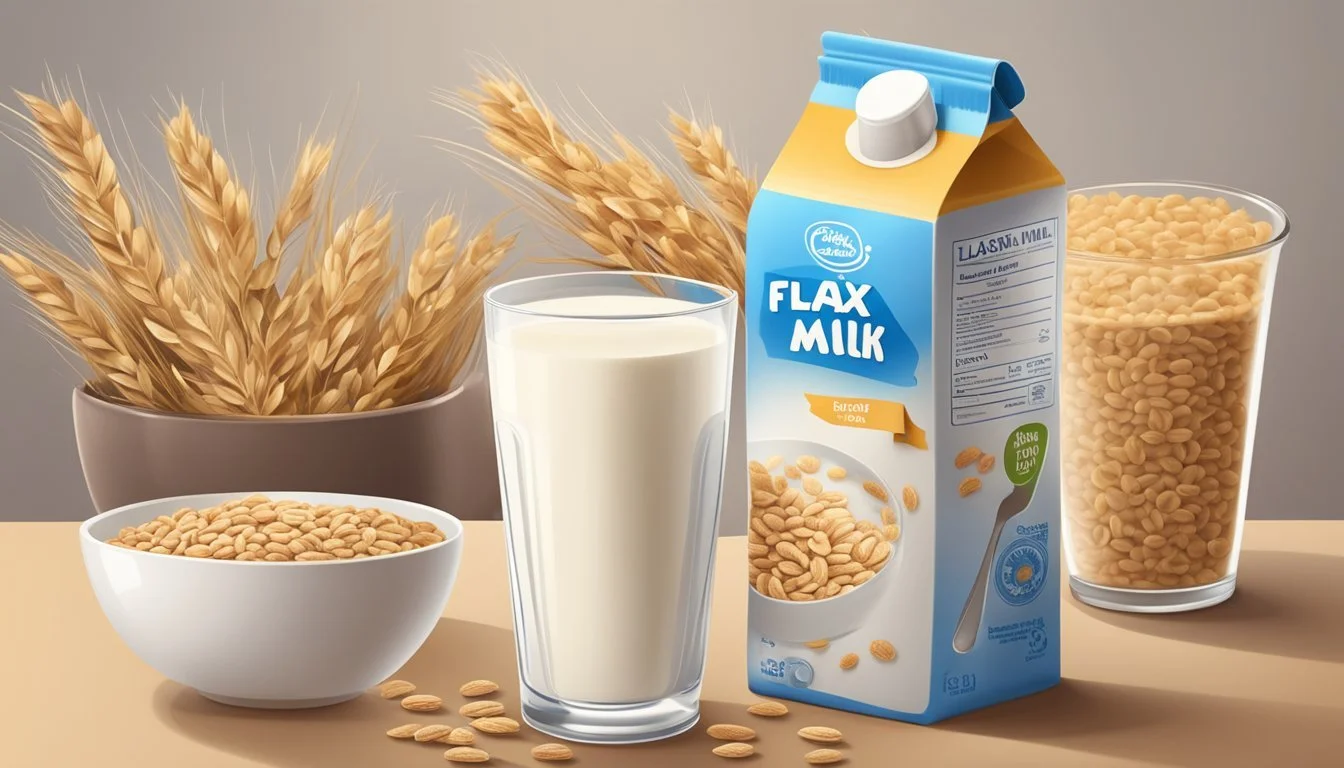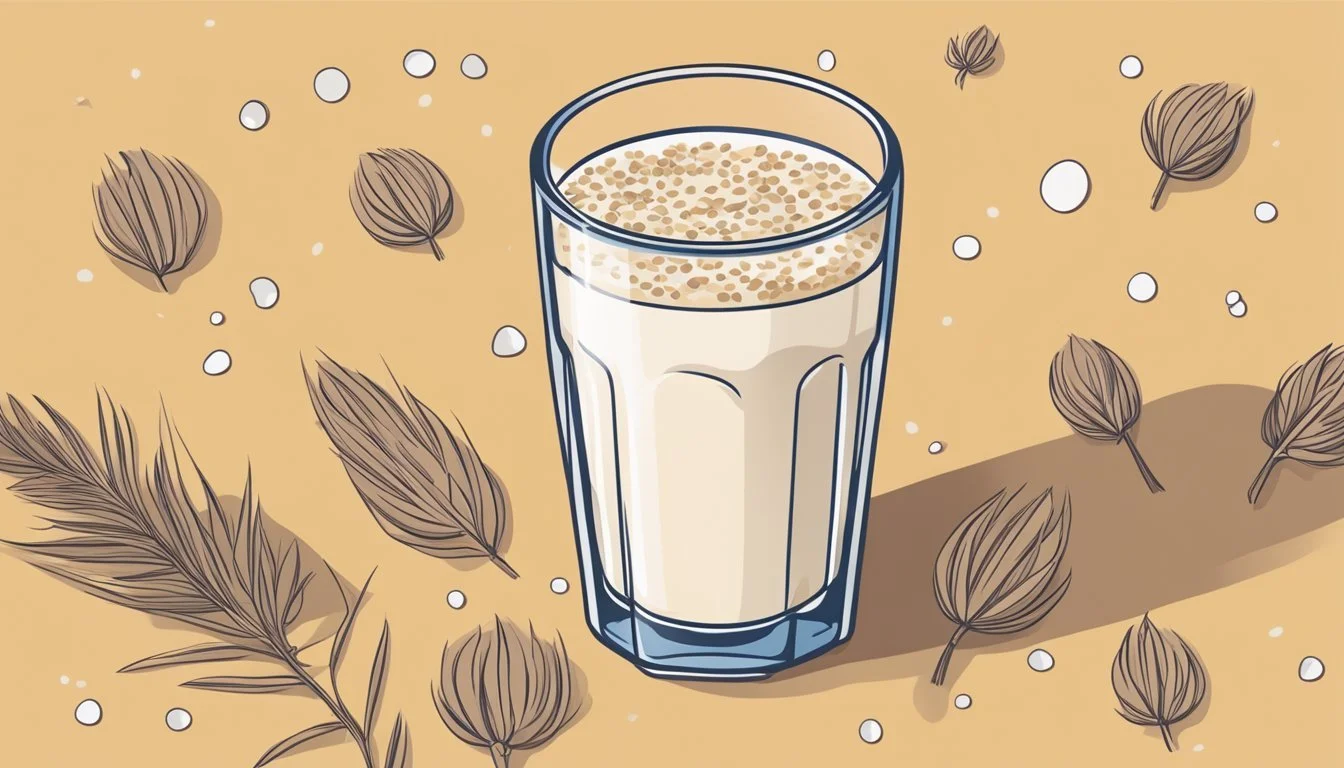Is Flax Milk a Good Alternative for Lactose Intolerance?
Unveiling the Facts
Flax milk is emerging as a notable dairy-free alternative for individuals with lactose intolerance. Made from ground flaxseeds and water, it offers a solution for those unable to digest lactose—a sugar present in cow's milk that can cause symptoms like diarrhea, gas, and bloating in lactose-intolerant people. Flax milk is not only free from lactose but also from cholesterol, making it a heart-healthy option.
Nutritionally, flax milk is rich in alpha-linolenic acid, a type of omega-3 fatty acid essential for maintaining heart health and potentially reducing the risk of chronic diseases such as cancer and heart disease. Compared to other plant-based milks, flax milk boasts a unique nutrient profile. It is often fortified with vitamins and minerals to closely mimic the nutritional benefits found in cow's milk.
Understanding Lactose Intolerance
Lactose intolerance is a common digestive issue characterized by the body's inability to digest lactose, often leading to various symptoms. It can be diagnosed through specific tests and affects different populations to varying degrees.
Symptoms and Diagnosis
Lactose intolerance occurs when the small intestine does not produce enough lactase enzyme to break down lactose, a sugar found in milk and dairy products. When lactose is not adequately digested, it can lead to digestive symptoms such as:
Bloating
Gas
These symptoms typically appear between 30 minutes to two hours after consuming lactose-containing foods or drinks. The diagnostic process may involve the following:
Lactose Tolerance Test: Measures the absorption of lactose in the digestive system.
Hydrogen Breath Test: Detects hydrogen in the breath after consuming a lactose-loaded beverage.
Stool Acidity Test: Often used for infants and young children, it measures lactose fermentation byproducts.
Population Affected by Age and Region
Lactose intolerance can affect individuals at any age, but it is more common in adults. The prevalence of lactose intolerance varies widely across different regions and ethnic groups due to genetic differences in lactase persistence. Here is an overview:
Infants and Children: Rare, as lactase levels are typically highest just after birth.
Adults: Symptoms can develop over time as lactase production decreases with age.
Geographical data indicates:
High Prevalence: Asia and Africa where up to 90% of the population may be affected.
Low Prevalence: Northern Europe, where lactase persistence is more common, affecting fewer people.
Nutritional Profile of Flax Milk
Flax milk offers a unique nutritional composition that caters to those seeking alternatives to dairy milk and provides essential nutrients beneficial for overall health.
Comparison to Cow's Milk and Other Milk Alternatives
When comparing flax milk to cow's milk, the most notable difference lies in their protein content. Cow's milk typically offers around 8 grams of protein per cup, while flax milk usually contains about 3 grams per cup. However, flax milk is advantageous for those with lactose intolerance as it is lactose-free.
Compared to other milk alternatives such as almond milk, soy milk, coconut milk, hemp milk, rice milk, oat milk, and cashew milk, flax milk stands out for its omega-3 fatty acids content due to the presence of flaxseed oil. Here is a brief comparison highlighting the nutritional value:
Milk Type Protein (per cup) Calcium Notable Nutrients Cow's Milk 8g High Vitamin D, Vitamin B12 Almond Milk 1g Varies Vitamin E Soy Milk 8g Varies Riboflavin, Potassium Coconut Milk <1g Low Medium-Chain Triglycerides Hemp Milk 2g Varies Omega-6 Fatty Acids Rice Milk 1g Low High in Carbohydrate Oat Milk 3g Varies Fiber Cashew Milk <1g Varies Monounsaturated Fats Flax Milk 3g Varies Omega-3 Fatty Acids
Vital Nutrients in Flax Milk
Flax milk is enriched with vital nutrients beneficial for health. It is a great source of omega-3 fatty acids, specifically alpha-linolenic acid (ALA), which is essential for heart health. It also provides a moderate amount of protein and is often fortified with vitamins and minerals such as calcium, vitamin A, vitamin D, and vitamin B12.
A typical serving size of flax milk contains:
Calories: Around 50
Total Fat: Approximately 2.5 to 3.5 grams, with a focus on mono- and polyunsaturated fats
Sodium: Roughly 85 milligrams
Carbohydrates: Approximately 4 grams
Fiber: Up to 3 grams
Protein: Around 3 grams
Calcium: Often fortified to be comparable to cow's milk
Vitamins: It may be fortified with vitamin A, vitamin D, and sometimes vitamin B12 and vitamin E
These components make flax milk an attractive alternative to cow's milk and other non-dairy milks, providing options for those with dietary restrictions or preferences.
Health Benefits and Downsides
Flax milk offers a dairy-free and plant-based alternative with notable benefits, especially for those with dietary restrictions, yet it also presents some considerations that should be taken into account for balanced nutrition.
Lactose-Free and Vegan Diet Compatibility
Flax milk is a lactose-free milk alternative, making it suitable for individuals with lactose intolerance who may experience digestive distress from dairy products. It is also fully vegan, aligning with plant-based diets, free from animal byproducts. This compatibility with vegan diets and dietary restrictions may contribute to its popularity among those seeking non-dairy milk options.
Lactose-Free: Beneficial for lactose intolerant individuals.
Vegan-Friendly: Compliant with plant-based dietary choices.
Weight Management and Heart Health
Unsweetened flax milk can be a helpful component in weight management due to its low-calorie profile. The presence of alpha-linolenic acid, an omega-3 fatty acid, supports heart health. Flax milk typically contains fewer carbohydrates and sugars compared to dairy milk, potentially aiding in weight control efforts.
Low in Calories: Advantageous for weight-conscious individuals.
Rich in Omega-3 Fatty Acids: Contributes to heart-healthy advantages.
Potential Allergenic and Digestive Concerns
Despite being a dairy-free option, some individuals may have allergies to flax seeds. Flax milk should be consumed with caution by those with known seed allergies. While its benefits for digestion are clear for those intolerant to lactose, the overall fiber content can be lower than necessary for digestive health.
Allergy Awareness: Necessary for those with sensitivities to seeds.
Digestive Health: May require complementing with high-fiber foods.
Influence on Bone Health and Immunity
While flax milk is enriched with calcium and vitamin D, essential for bone health, its naturally occurring levels of these nutrients are lower than in cow's milk. This means careful consideration is needed for individuals relying solely on flax milk to meet their daily recommended intake, thereby potentially affecting bone density over time.
Calcium Enrichment: Often fortified in flax milk for bone strength.
Vitamin D Addition: Also commonly added to support immunity and bone health.
Flax Milk in Daily Consumption
Flax milk is becoming a popular dairy alternative, particularly for those with lactose intolerance. It is chosen for its nutritional benefits and versatility in the kitchen and when paired with various foods and beverages.
Suitability for Cooking
Flax milk can be used in cooking, especially for those seeking a dairy-free alternative. While it is important to note that flax milk does not possess the same creamy texture as dairy milk, it still can be used effectively in baking and other culinary applications. Its relatively neutral taste does not overpower dishes, making it suitable for both sweet and savory recipes. However, if a recipe requires a creamy consistency, modifications may be needed since flax milk is comparatively thinner.
Pairing with Foods and Beverages
In terms of pairing with foods and beverages, flax milk can be enjoyed in a variety of ways. It is commonly added to cereal and coffee, where its light consistency is generally not an issue. Flax milk comes in plain and flavored varieties such as vanilla, which can complement the flavor profile of beverages and desserts. However, it may not be the best choice for concocting a frothy coffee or making a creamy ice cream due to its lack of thickness.
Recommended Intake and Storage Guidelines
When incorporating flax milk into daily consumption, it is important to adhere to intake and storage guidelines to ensure quality and nutritional value. An organic flax milk option can be chosen for those prioritizing organic products. Once opened, flax milk should be stored in the refrigerator and typically has a shelf life similar to other alternative milk options. Always check the label for the manufacturer's recommended storage practices and consume flax milk within the shelf life period to enjoy its optimal flavor and nutritional benefits.
Environmental and Ethical Considerations
The environmental impact and ethical implications of flax milk create a compelling narrative for those considering a dairy-free alternative. These aspects pertain to the sustainability of its production and the broader implications for animal welfare.
Sustainability of Flax Farming
Flax farming, which is integral to flax milk production, is considered environmentally friendly due to its low requirement for water and pesticides, especially when compared to traditional dairy farming. The cultivation of flaxseeds, used to make flax milk, generally follows sustainable agricultural practices. Organic flax farming emphasizes minimal chemical use, which in turn reduces the environmental footprint. Flax plants also have a positive effect on soil health, often leaving it richer in nutrients.
Water Usage: Flax requires significantly less water than dairy cows, positioning it as a more sustainable crop.
Land Utilization: Efficient land use in flaxseed cultivation often leads to lower deforestation rates.
Pesticides and Chemicals: Flax typically requires fewer chemicals than other crops, making it an environmentally sound choice.
Animal Welfare and Non-Dairy Impact
The production of nondairy milk like flax milk also touches on ethical considerations, chiefly animal welfare. Consumers often choose plant-based options like flax milk to align with a vegan lifestyle, motivated by a desire to prevent animal exploitation that occurs in conventional dairy industries. The shift towards plant-based diets is seen as a step towards more ethical consumption patterns.
Dairy Industry Concerns: Traditional dairy farming has come under scrutiny for ethical concerns, including the treatment of cows.
Vegan Values: The plant-based nature of flax milk meets vegan standards, avoiding any animal by-products.
Impact on Dairy Farms: The growing popularity of nondairy alternatives can influence traditional dairy farmers to adopt more humane practices.
Shopping Guide and Product Varieties
When selecting flax milk, consumers should look for high-quality brands and understand the labels to choose the best option for their dietary needs.
Identifying Quality Flax Milk Brands
Shoppers seeking flax milk should research brands that are reputed for their quality. Good Karma is one such brand that offers flax milk with a nutty flavor, and they often come in organic varieties. One should search for brands that use minimal additional ingredients and emphasize the purity of their flax milk. It is advisable to choose unsweetened varieties to avoid added sugars. Reading online reviews and checking for third-party certifications can also guide towards reputable choices.
Understanding Labels and Ingredients
The label on a flax milk carton holds crucial information. Consumers should look for terms like "unsweetened" to avoid unnecessary added sugars. Ingredients to be aware of include thickeners, which are often added to non-dairy milk to improve texture. Added ingredients like cocoa powder may be present in flavored versions. Labels may also indicate if the flax milk is organic, which suggests it's made without the use of pesticides or synthetic fertilizers. Checking the nutritional information for sugar content and the presence of other additives will help in making an informed decision.
Conclusion
Flax milk is a standout among lactose-free alternatives, offering a welcome option for individuals with lactose intolerance. It provides a nutritional choice that aligns with diverse health goals, being free from lactose and often enriched with vitamins and minerals.
The advantages of flax milk include a high content of omega-3 fatty acids, which are known for their anti-inflammatory properties. Many varieties also boast added calcium and vitamin D, both crucial for bone health. Flax milk's low calorie and sugar content, coupled with its absence of cholesterol, make it a heart-healthy option.
Nutritional Profile at a Glance:
Calories: Comparable to cow's milk
Sugar: Generally low
Protein: Less than cow’s milk; often supplemented
Fiber: Naturally occurring
Fat: Primarily healthy omega-3s
For those managing lactose intolerance, flax milk is gentle on the digestive system. While it does not naturally contain protein akin to cow's milk, many brands fortify their products to match this nutritional aspect. Consumers should note, however, that protein amounts can vary between brands.
When choosing flax milk, it is advisable to opt for unsweetened versions to avoid added sugars. As with all dietary choices, individuals should consider their overall nutritional needs and consult with a healthcare provider to ensure that flax milk is congruent with their health objectives.
One must always read labels carefully to understand what is in their flax milk, as ingredient lists and nutritional benefits can vary. In summary, flax milk is a viable and healthful milk substitute for those avoiding lactose, contributing positively to a balanced diet when incorporated mindfully.





